I think we have to be realistic in terms of the starting point for Walitt. People can, of course, change their minds about an illness. But to me, the effort preference business in this paper, and a few other parts, are consistent with what he thought 10 years ago (quotes below). Since he was the clinical lead on this project, the research itself and the publications were always going to be, or have elements that were, unpalatable to patients.
My hope is that other researchers are reading the paper, ignoring the effort preference stuff, and getting good ideas for what to look at next in the immune system, central nervous system etc to ultimately move us towards effective treatments. I’m imagining people like Maureen Hanson writing NIH funding applications for studies that might actually get us somewhere. Others will, of course, keep doing what they do.
Here are quotes from his published papers and interviews up to 2015
(previously posted on PR
https://forums.phoenixrising.me/threads/walitt-and-shorter-again.48115/page-2).
The first few quotes are on fibromyalgia. You will see further on that he placed “chronic fatigue syndrome” in the same category as FM, so these quotes are relevant.
In an interview with Dr Walitt's from September 2015 (link no longer works), he said:
In Wang, Walitt et al’s 2015 chemo-brain paper available at
http://www.ncbi.nlm.nih.gov/pmc/articles/PMC4750385/, Walitt and his co-authors state
In the same paper, further clarification is given that Walitt places chronic fatigue syndrome firmly in the same somatoform category where he places fibromyalgia:
Dr Walitt describes his research interests in this researcher story, dated August 2012 available at
http://georgetownhowardctsa.org/researchers/researcher-stories/brian-t--walitt-
Edited to add 2 quotes referencing "CFS" that I had omitted by accident.

